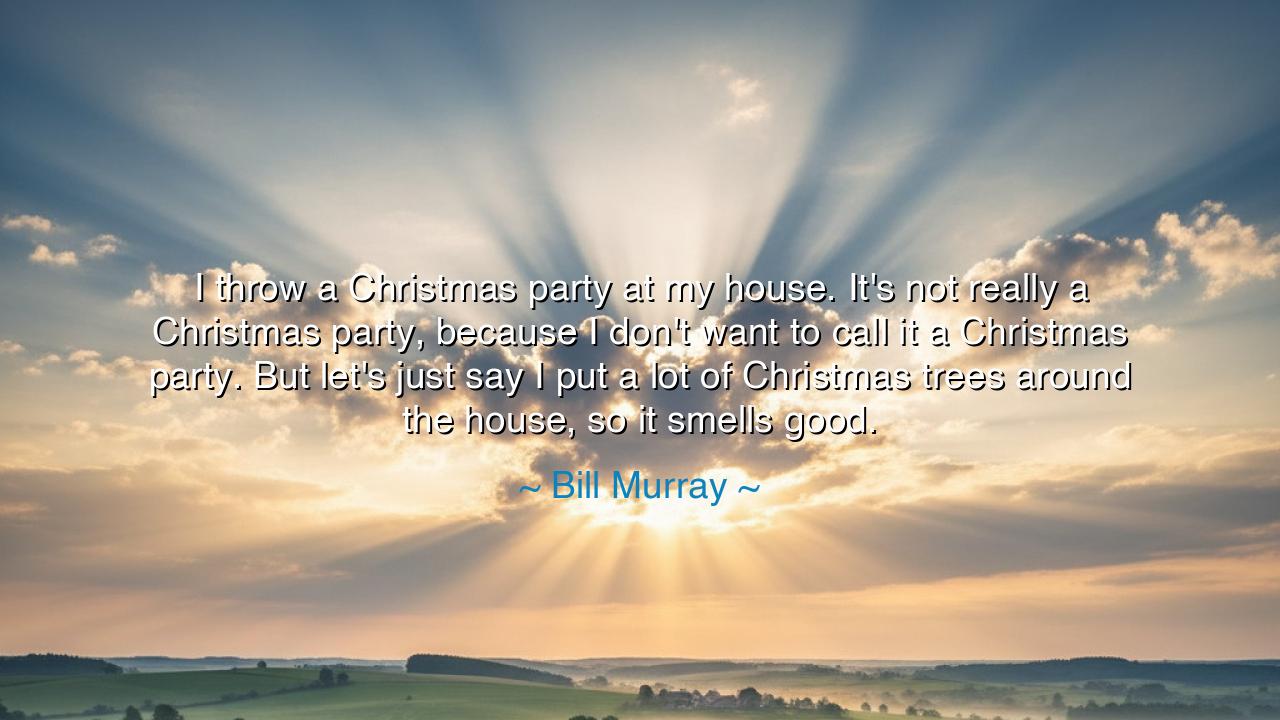
I throw a Christmas party at my house. It's not really a
I throw a Christmas party at my house. It's not really a Christmas party, because I don't want to call it a Christmas party. But let's just say I put a lot of Christmas trees around the house, so it smells good.






Host: The house glowed like a warm secret tucked in the belly of winter. Outside, snow fell in slow, deliberate spirals, catching the streetlight in glittering bursts. The night air smelled of pine, smoke, and something sweet — maybe cinnamon from a neighbor’s kitchen, maybe nostalgia itself.
Inside, the fireplace crackled, filling the room with the rhythm of warmth. The walls were lined with strings of lights, golden and unassuming. Pine trees — small, large, crooked, perfect — stood in every corner, each dressed in its own quiet personality. The air was thick with laughter, music, and the faint clinking of glasses.
Jack leaned against the doorframe, tie undone, the faint trace of amusement in his eyes. He was watching the guests — a mosaic of humanity in sweaters, laughter, and bad rhythm. Jeeny was at the piano, playing a lazy tune, her fingers moving not for perfection but for joy.
Host: The party wasn’t loud. It wasn’t wild. It was… human. The kind of night that happens when people stop performing and start existing.
Jeeny: (grinning) “Bill Murray once said, ‘I throw a Christmas party at my house. It’s not really a Christmas party, because I don’t want to call it a Christmas party. But let’s just say I put a lot of Christmas trees around the house, so it smells good.’”
Jack: (chuckling) “That sounds exactly like him — allergic to definitions, but addicted to atmosphere.”
Jeeny: “Exactly. It’s not about labels. It’s about the feeling.”
Jack: “And the smell.”
Jeeny: “Especially the smell. Pine and mischief.”
Host: The firelight flickered across their faces — gold and alive. A faint melody drifted from the speakers, something half-jazz, half-memory.
Jack: “You know, that’s what I love about Murray. He turns cynicism into warmth. He doesn’t celebrate Christmas. He just… lets it happen.”
Jeeny: “That’s what makes it genuine. When joy doesn’t feel like a performance.”
Jack: “And when the trees are there for scent, not show.”
Jeeny: “Exactly. It’s about presence, not presentation.”
Host: A guest laughed too loudly at something in the next room. A cork popped. The lights on one of the trees flickered, throwing little reflections like dancing ghosts across the windowpane.
Jack: “You know what’s funny? Everyone pretends to love the holidays, but half of them are exhausted by it — the pressure to smile, to give, to be perfect. Bill’s version… feels like a rebellion.”
Jeeny: “It is. A small, pine-scented act of resistance.”
Jack: “Against what?”
Jeeny: “Against obligation. Against pretending happiness instead of just being it.”
Jack: “You mean — joy without agenda.”
Jeeny: “Exactly.”
Host: She played a few more notes, then let her hands rest on the keys, the last chord lingering like a sigh. The room hummed softly — laughter in the distance, the fire’s crackle, the subtle music of belonging.
Jack: “You know, I’ve been to parties where everything’s perfect — the decor, the food, the timing — and yet you leave feeling… untouched.”
Jeeny: “Because perfection doesn’t touch you. People do.”
Jack: “This, though — the mismatched ornaments, the uneven lights, the trees crowding the corners — it feels alive.”
Jeeny: “It’s not decoration. It’s character.”
Jack: “It’s Christmas, but it’s not Christmas.”
Jeeny: “Exactly the point.”
Host: A small dog wandered through the room, tail wagging, carrying a silver bow in its mouth. Someone cheered. Another guest clinked their glass and toasted to “no expectations.” The cheer spread softly, like an inside joke shared with the universe.
Jack: “You know what this reminds me of?”
Jeeny: “What?”
Jack: “How the best memories never announce themselves. They just happen — quietly, in rooms that smell like pine and laughter.”
Jeeny: “And slightly burnt cookies.”
Jack: (grins) “Always slightly burnt.”
Host: The room dimmed as someone turned down the lights. Only the fire and the glow of the Christmas trees remained, flickering gently like living constellations.
Jeeny: “You ever think people like Bill Murray understand something deeper about celebration? That maybe it’s not about pretending life is perfect — it’s about embracing how gloriously imperfect it really is.”
Jack: “That’s why he said he didn’t want to call it a Christmas party. Because the second you name joy, you start managing it.”
Jeeny: “And joy doesn’t need management.”
Jack: “Just good company and the smell of trees.”
Host: The piano’s hum returned — slow, quiet. A woman near the fireplace began to hum along, soft and off-key. No one corrected her. The imperfection made it beautiful.
Jack: (raising his glass) “To Bill Murray.”
Jeeny: (smiling) “To anyone who knows how to find the sacred in the ordinary.”
Jack: “And to houses that smell like something real.”
Host: Their glasses clinked softly. The moment lingered. Outside, the snow thickened — falling heavier now, blanketing the street in a hush that made the world feel newly born.
In that hush, amid the light and laughter, Bill Murray’s words echoed like a wink from somewhere between irony and truth:
“I throw a Christmas party at my house. It’s not really a Christmas party, because I don’t want to call it a Christmas party. But let’s just say I put a lot of Christmas trees around the house, so it smells good.”
Host: Because joy doesn’t always need meaning —
sometimes it just needs pine needles and people.
And maybe the holiest nights
aren’t the ones that follow tradition,
but the ones that smell like life,
and sound like laughter,
and belong to no one but now.






AAdministratorAdministrator
Welcome, honored guests. Please leave a comment, we will respond soon